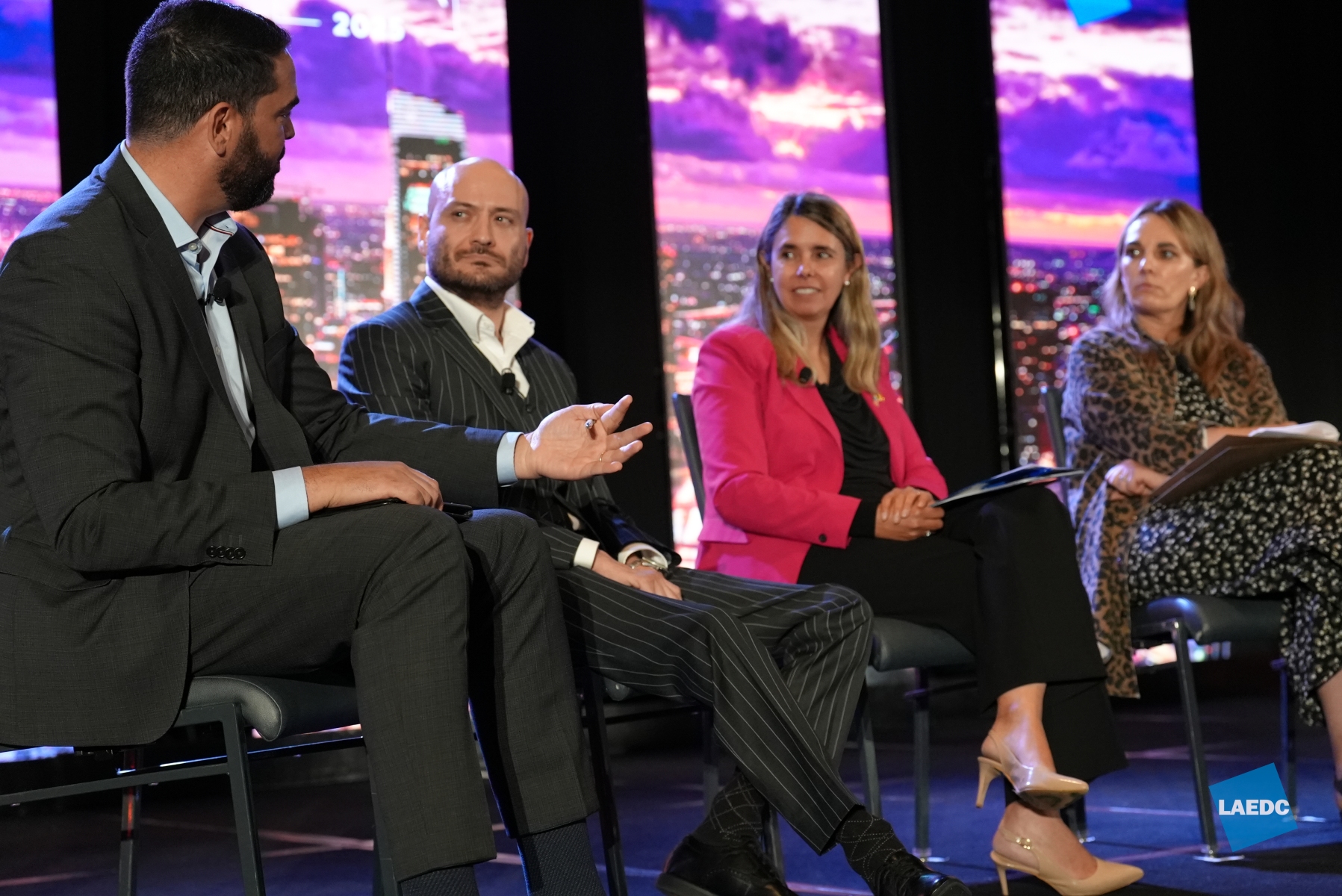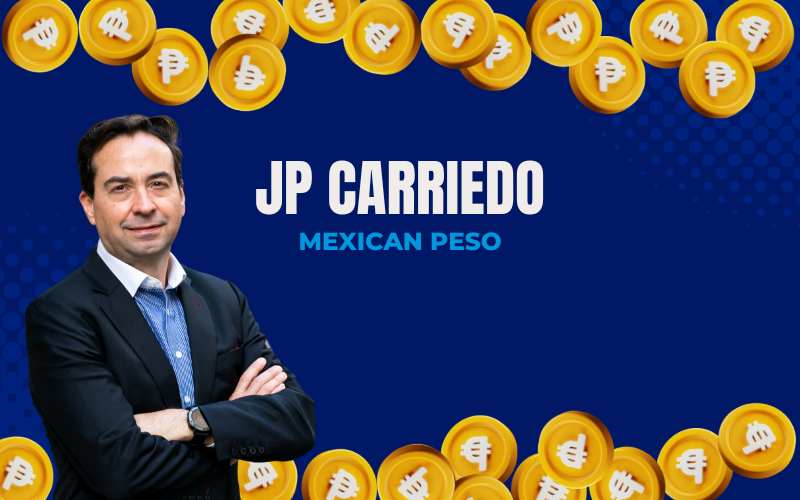Full Transcript:
Felipe Cusnir
I want to turn it over to Juan. With Monex, your company has been right in the middle of all of this because the money is flowing, right? I think Ron Fearson mentioned, you know, capital move and people move. You’re moving money, right. You’re helping companies pay their suppliers or change their, relocate their manufacturing plants.
00:00:21
You know, Juan, can you explain a little bit more about what you do and what you’ve been seeing from the business side, how the money is flowing in or out? You do a lot with Mexico, my understanding. And also I hear that your last three months were…
Juan Perez
I mean, you know, it’s been a roller coaster type year where there are many things that are now concerns for trade that weren’t before. And I think I’ll start by saying that it’s almost a shame that California does not have its own currency. Right. But we’ll get to that later. I think what one of the things that, you know, obviously we’re in the midst of commerce, right?
00:00:58
And it’s a very competitive market, but it’s never been this wild. What’s the thing that ultimately businesses want? Markets ultimately are looking for a source of reliability and stability. And when the very financial system that runs straight is the US dollar, everybody looks to the United States for not only policy but guidance.
00:01:19
And to be able to say, I have long term planning capability because there is a source and a core center that we can believe in that’s ultimately dramatically changing. Right. And I know I’m from D.C. and I don’t wanna get political even though that’s second nature. But what is happening is we have to be concerned about de dollarization because the financial environment and foreign exchange, where it ultimately is, we have currencies and what are foreign exchange currencies?
00:01:47
Why do we have that model, ultimately these commodities such as the euro, the Saudi Arabia, Real, the Mexican peso, what they are is tools for us to be able to judge the management of countries. Those are the reason why I mentioned California. Right. Because if California is such an outstanding job, it would be great to be able to invest in California tight bonds or in California.
00:02:10
Right. That’s one of the things that is starting to hit with all of the friction that we’re seeing between federal and state and business interests as well. Like I said, ultimately, at the very base and at the very core center, we want a US dollar that you can at least plan and see some sort of patterns.
00:02:28
But lately for me to be able to give you a one year outlook on Euro, it’s become incredibly difficult. I don’t know if we are going to lower tariffs because they’re an ally supposedly. I’m not sure if they’re going to hit us back with retaliation. I’m not sure if Italian furniture makers or Italian furniture importers are going to start looking at perhaps cheaper sources.
00:02:52
So that’s the type of thing that I absolutely am in the very middle of. But de dollarization is going to affect all of us because it affects the purchasing power that we have. And for anybody that is in business. Right. Ultimately, the great thing about the US dollar is that you can always negotiate from a point of dominance.
00:03:07
When you’re anywhere in the United States, you’re saying “I can pay you in US Dollars.” And they’re probably elated across the world. Not anymore. What we are ultimately seeing is a change towards what we call in the Forex world you have the ask and the bid side.
Felipe Cusnir
Right.
Juan Perez
So a lot of it is asking for currencies because I’m settling in US Dollars. So we sell a lot of currencies but we’ve ultimately seen a lot of repatriation. And why? Because you know, do we really want to just force our business partners and our overseas people to get paid in US dollars when the fluctuation and the volatility or perhaps the deterioration, I mean we’ve seen why I don’t have the statistics, I didn’t bring my notes.
00:03:51
But it’s about a 6%, let’s be very accurate. Counting today’s dramatic movements post the Fed, it’s about a 6.5% dollar weakening in comparison to its major peers. And this is according to the Bloomberg Dollar spot index. So what is ultimately helping me, and helping California and helping the United States, is personal consumption.
00:04:13
So what we are going to be watching out for in the next couple of months is the trends in personal consumption. If the Americans consumer can continue to be the backbone of the American economy, ultimately it’s going to be difficult because we have to worry about stagflation right now. For some of you guys that may not be familiar with stagflation, right.
00:04:32
We’re talking about stagnant growth accompanied by higher inflation and higher prices. So it’s a really crappy situation, right? Because then ultimately you’re just paying more for getting less. And one thing with California that I’ve heard throughout, you know, the event today is, is being concerned about the supply chain because California is what, 40% of Chinese imports come through here.
00:04:54
So while we do not directly deal with Chinese Yuan as much, we are seeing a Lot of movement for CNH, which is this offshore for us. Basically, CNH is the Chinese one that you can get out of Hong Kong along with the Hong Kong dollar. So what we’re ultimately dealing with the most, as you guys are, is people looking for alternatives and looking for some source of reliability, which has become incredibly difficult.
Felipe Cusnir
Excellent, Excellent. No, your outlooks are great. I know your material. But from your experience for the last couple of months, considering January onward, shed a light on the trends that you’ve seen with your key markets, either Mexico and US or US and European Union. What are the key trends that you’re seeing in terms of the behavior for those clients?
Juan Perez
So one of the things, of course, you know, our bread and butter, being Mexico, the Mexican peso has surprised it because, you know, considering the fact that there was, I believe that the US dollar was actually going to improve dramatically, the Mexican pesos improved because, and I’ll add a few factors, one of them is economics.
00:06:09
There’s still no contractionary pressures, no recessionary pressures developing in Mexico. So we’re very happy for that. And part of the geopolitical reason for that is we are very thankful for President Claudia Sheinbaum. Claudia Sheinbaum came from the AMLO school of how to deal with the first Trump term. And I think she has been phenomenal in doing the one thing that is the most important for us, which is holding up the USMCA.
00:06:38
So that’s really one of the things that I would say for California, for Los Angeles. It’s a part where we truly are really immersed and we help in managing that risk. And I would say this about foreign exchange, which I explained to a few people I had conversations with, but ultimately you want stability in business.
00:07:00
So what foreign exchange, a lot of what we do is we navigate through the world of protecting yourself. You want to protect yourself from the market destroying you, right? But what we’re now seeing as a major, major trend is the other “P” in foreign exchange, which is participation. People are looking at the volatility, the wild roller coaster, ride…
00:07:21
The fact that, you know, at Deutsche bank and other banks, which were wrong, we had the Euro dropping to perhaps 30 at some point. But the investment by Germany, in fact, that they’re opening up their coffins is making the Euro incredibly strong. It’s the strongest that it’s been. So these trends are happening much faster than they’ve ever been.
00:07:41
And that’s why a company like us, in our guidance is much needed, because we kind of all, as a globalized community, need to hold each other’s hands.
Felipe Cusnir
Excellent.





